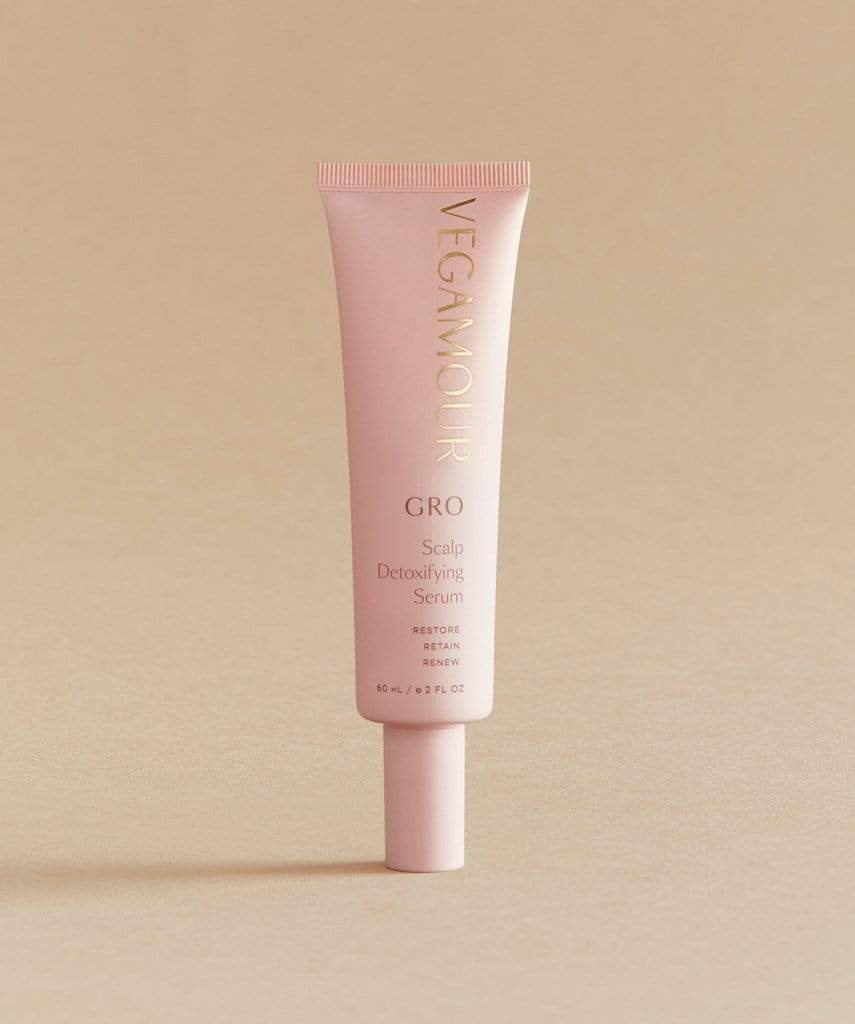Sweating is completely natural, and it's how the body cools itself. Sweat glands also help filter toxins, which in turn boosts the immune system. However, certain conditions might cause your sweat glands to go into overdrive, which can lead to a sweaty scalp. Excessive sweating can strip your scalp of its protective natural oils, which in turn could wreak havoc on your scalp and hair health.
To get to the root causes of a sweaty scalp, VEGAMOUR spoke to several hair experts. Read on to find out what to do if scalp sweat is putting a damper on your good hair days — plus, find out what products you really should be using to support a healthier looking scalp.
What Causes Scalp Sweat?
Your entire body is covered in sweat glands, including your scalp. While sweating is completely normal, perspiring uncontrollably can indicate that your body is having trouble regulating its internal body temperature.
So, how much is too much? If you find that your scalp is excessively sweaty on a regular basis, even when you are not hot, exercising, stressed or eating spicy foods, you could be suffering from a condition called hyperhidrosis or craniofacial hyperhidrosis.
Shop: GRO Foundation Kit
What Is Hyperhidrosis?
There are two types of hyperhidrosis: primary hyperhidrosis and secondary hyperhidrosis. If you experience excessive sweating, these health conditions may be to blame. It's important to understand the differences between the two before starting treatment. Here are the types of hyperhidrosis and their physical symptoms:
- Primary Hyperhidrosis: Also called primary focal hyperhidrosis, this condition is characterized by excessive sweating that is not caused by another medical condition, physical activity, increased temperature or as a side effect of medications. People with this condition typically have sweaty hands, sweaty feet, sweaty underarms and a sweaty face or head.
- Secondary Hyperhidrosis: Also called secondary generalized hyperhidrosis, this type of excessive sweating is caused by another medical condition — heart disease, respiratory illnesses, cancer, diabetes or menopause — or is a side effect of a medication. Unlike those with primary focal hyperhidrosis, people with secondary hyperhidrosis sweat excessively on larger or other areas of the body. They may also experience night sweats.
Read More: Help! I Have a Smelly Scalp — What Can I Do?
How to Treat Hyperhidrosis
Hyperhidrosis can have several treatment choices, depending on its intensity and severity. This includes the following:
- Antiperspirants containing aluminum chloride can be applied to reduce excess sweating, but be advised that this can be irritating to the sensitive skin of the face and head.
- Botox injections work by decreasing the activity of nerves affecting the sweat glands. However, it may take several treatments for the injections to start working, and results typically only last for 12 months.
- Surgical treatment to remove sweat glands is a treatment option for severe or persistent hyperhidrosis, although it’s primarily used for excessive sweating from the armpits.
- Oral medications, specifically, anticholinergics, act on the body's chemical messenger, acetylcholine, before it is able to reach sweat gland receptors that trigger sweating.
The Problem With Excessive Sweating
Not only is excessive sweating uncomfortable, but it can also lead to some serious scalp issues that go way beyond just sweaty hair. Excess sweat on the scalp can cause irritation and clog the surrounding hair follicles, leading to a whole host of problems.
"A lot of times, the buildup compounds, and if you don't wash often, it will flake and peel," said Michael Dueñas, celebrity hairstylist and founder of Veluer Creative. "This can also clog pores, cause ingrown hairs and/or, in extreme cases, hair loss. This also leads to oily weighed-down hair."
"It also contributes to the deterioration of the hair follicle and leaves dry, brittle hair fibers," explained Dr. Craig Ziering, expert hair transplant surgeon and founder of Ziering Medical.
Left untreated, extreme sweating might cause hair damage, which can lead to changes in density, appearance and even hair loss. If you think your scalp sweat is out of control, talk to a doctor to see if you have any underlying condition that may be causing your sweat glands to work overtime.
Read More: How to Get Rid of Oily or Greasy Hair
Tips to Avoid Scalp Sweat
Now that you know more about what can cause a sweaty scalp, here are some tips that will help you deal with it.
Wear a Hat
Hats can protect your scalp from getting sunburned and keep sweat from getting in your eyes, but they can also keep you cool. Some baseball hats have the opposite effect and trap heat, but a lightweight hat designed with mesh or air vents allows for maximum breathability and evaporation. This allows your body to sweat naturally and lets the heat escape from your head, keeping you cool and your sweaty scalp under control.
Cleanse Your Scalp Regularly
Use a gentle shampoo and conditioner — preferably that are free from potentially irritating parabens, phthalates, sulfates, silicones, mineral oils and synthetic fragrances — to cleanse, moisturize and nourish your tresses and scalp without leaving pore-blocking residue behind.
On the flip side, you don't want to overwash your hair. This can lead to dry hair and scalp, which can actually trigger more oil production and more head sweating.
Use Dry Shampoo
Don't have time to wash your hair? On those busy days, use a dry shampoo to help absorb excess oils and give your roots a refresh. Dry shampoo works by using oil-absorbing ingredients, such as rice starch, to soak up excess oil.
Use a Scalp Detoxifying Serum
If you have a lot of buildup on your scalp, using a scalp serum before shampooing can help. VEGAMOUR's GRO Scalp Detoxifying Serum can help support a clearer scalp. The proprietary vegan silk in the serum will help gently reduce pore-clogging buildup, dirt and other impurities while creating a protective barrier that locks in moisture.
And don't worry, adding a scalp detoxifying serum to your regular hair care routine is easy. Part your hair into even sections. Then, apply the serum and massage it into your scalp. Leave it on for 5 to 10 minutes before following up with shampoo and conditioner. Repeat weekly for best results.
Learn More: How to Apply VEGAMOUR Scalp Serums for Best Results
See a Doctor
If you have more serious scalp problems that persist after caring for your scalp with at-home remedies and prioritized scalp care, it might be time to make an appointment with a licensed trichologist or dermatologist to investigate further. A doctor can help determine if you have any medical conditions that are causing your sweaty scalp.
Build Healthy Habits for a Healthy Scalp
You can't stop your scalp from sweating, but you can get excessive sweating under control with the right care and treatments. By caring for your scalp the way you care for the rest of the skin on your body, you can wrangle those overactive sweat glands and return your scalp to a state of homeostasis.
#include-related-slider#
More From VEGAMOUR
- Shop: Our Favorite Healthy Scalp Products
- How to Moisturize Your Scalp
- Dry Scalp But Oily Hair? Try This
- Why Is My Scalp So Dry?





















